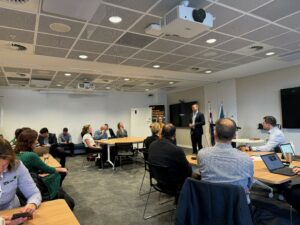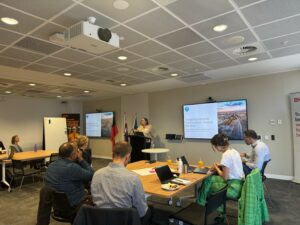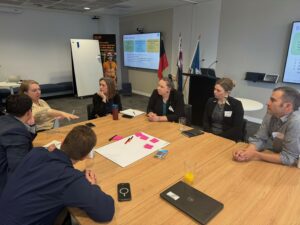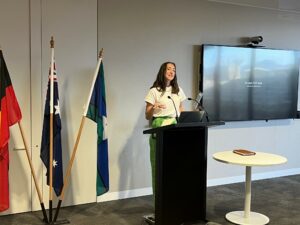Our SA ZERO members and stakeholders gathered on 17 September for a workshop which focussed on promoting best practices for integrating holistic thinking into organisational and regional climate transition strategies, fostering collaboration towards a low-carbon future in South Australia that also empowers our communities.
Co-hosted by members BHP and CSIRO, the workshop was an interactive participatory discussion where the attending SA ZERO members as well as invited guests from local governments and organisations could work through some of their common challenges to developing and actioning Climate Transition Action Plans (CTAP)*.
Key Takeaways:
- The organisations in the room shared common challenges in the practical steps for developing and implementing CTAPs and potential approaches. Engaging with various parts of the business early, to understand their unit’s existing processes and priorities, is a key step to getting true cross-organisational endorsement and commitment to the bold actions required for CTAPs. Ensuring your key internal stakeholders (e.g procurement, fleet, finance) have the tools they need to integrate climate risk into their business as usual, leveraging the CTAP as a strategic reference, is fundamental to implementing the CTAP. As well as bottom-up buy-in, having endorsement from top of the organisation allows the CTAP outcomes to be elevated as cross-organisation priorities and embedded into capital allocation metrics. The process of bringing others along on the journey, elevating understanding of integrated climate action, is often the most impactful and rewarding element.
- Understanding the boundaries and implications of your organisation’s CTAP is critical. A whole of system analysis should consider the external factors that may either reinforce or unexpectedly undermine a CTAP. We discussed the maturity of various voluntary and mandatory climate reporting standards, and their intersection with existing corporate financial and risk reporting, how they are influenced by state, federal and global climate targets, how they interact with other ESG themes like biodiversity and modern slavery, as well as identifying the communities that will be impacted by the Plan.
- When engaging communities on any transition, start by understanding what their broader wants, hopes, pain points and opportunities are. Solving the climate crisis cannot happen in isolation from the economic, environmental and social ecosystems of a resilient community. We explored the approaches for participatory stakeholder collaboration that CSIRO have been implementing through regions across the country, including the Upper Spencer Gulf in South Australia, to integrate industry growth with decarbonisation goals while uplifting local communities. Their early findings show that the incredible co-benefits of meaningful climate action (e.g. quality of life, steady employment, health and wellbeing, economic growth) are where we should start from. Funding for climate projects, like the Future Made in Australia fund, are now explicitly including community benefits as a requirement for successful applications.
- A common theme here across all of our SA ZERO workshops has been the challenge of access to meaningful data to make informed decisions in climate action, especially from Small and Medium Enterprises (SMEs) suppliers. The group discussed potential approaches that the SA ZERO cluster and its members can take in the next 1-5 years to uplift the capacity of the thousands of key local suppliers to meaningfully measure and report on their carbon emissions. However, trying to capture and model all data points will slow us down.
- Solving complex problems across diverse stakeholder groups, sharing the resources, risk and responsibility, is what SA ZERO is all about.
Next Steps:
- The learnings from this session has informed how our members and key stakeholders are approaching integrated CTAPs with best practices in mind
- Our following workshops throughout the year will continue to deep dive into practical topics that accelerate the pace and scale of decarbonisation and circularity across SA
*More about CTAPs:
A Climate Transition Action Plan (CTAP) is a strategic, action-based roadmap developed by organisations to guide and communicate their transition towards a low-emissions and climate-resilient future. It includes clear goals and targets for reducing greenhouse gas emissions and improving sustainability practices, accompanied by specific strategies and actions to achieve these objectives within defined timelines.
CTAPs integrate climate goals into broader business strategies, emphasising innovation, risk management, and stakeholder engagement. They serve as a framework for monitoring progress, ensuring transparency, and aligning organisational efforts with global climate objectives while enhancing resilience and seizing opportunities in a sustainable economy.
The complexity and challenges arises when multiple business are implementing plans in regions and may be competing for the same resources or plans may not be aligned with community expectations. New modes of building participatory pathways can reduce contestation and provide broader co-benefits for regions.
Click here for more about CTAP.
Click here to see BHP’s latest CTAP.



